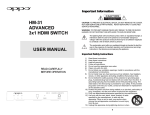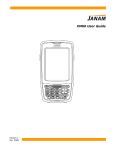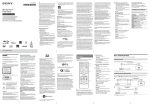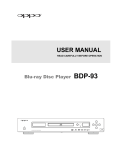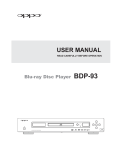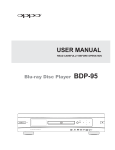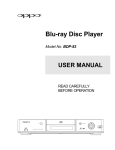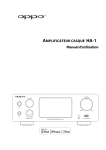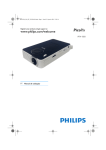Download HA-1 User Manual
Transcript
HEADPHONE AMPLIFIER HA-1 USER MANUAL USB Made for Table of Contents Important Information ........................................................................................................................................................ 1 Precautions................................................................................................................................................................... 2 FCC Statement (For U.S. Customers).......................................................................................................................... 2 Canada Statement (For Canadian Customers) ............................................................................................................ 2 Legal Notice.................................................................................................................................................................. 3 Compatible iPod/iPhone/iPad Models .......................................................................................................................... 3 Introduction ........................................................................................................................................................................ 4 Accessories .................................................................................................................................................................. 4 Installation ......................................................................................................................................................................... 5 Front Panel Controls..................................................................................................................................................... 5 Back Panel Connectors ................................................................................................................................................ 5 Remote Control ............................................................................................................................................................ 6 Remote Control Buttons .......................................................................................................................................... 6 Battery Installation ................................................................................................................................................... 6 Using the Remote Control ....................................................................................................................................... 7 Remote Control App for Smartphones .................................................................................................................... 7 Headphone Output Connection .................................................................................................................................... 8 Balanced Headphone Jack Pin-out ......................................................................................................................... 8 Using the HA-1 as a Pre-Amplifier or DAC ................................................................................................................... 9 RCA Stereo Audio Outputs ...................................................................................................................................... 9 XLR Balanced Audio Outputs .................................................................................................................................. 9 Triggers ................................................................................................................................................................... 9 Input Signal Connections............................................................................................................................................ 10 RCA Stereo Audio Inputs ...................................................................................................................................... 10 XLR Balanced Audio Inputs................................................................................................................................... 10 Coaxial Digital Audio Input .................................................................................................................................... 11 Optical Digital Audio Input ..................................................................................................................................... 11 AES / EBU Digital Audio Input ............................................................................................................................... 11 USB (Type B) Audio Input ..................................................................................................................................... 12 Mobile USB Audio Input ........................................................................................................................................ 12 Bluetooth Audio Connection .................................................................................................................................. 13 Bluetooth Setup ..................................................................................................................................................... 13 Using the OPPO HA-1 ..................................................................................................................................................... 14 Basic Operations ........................................................................................................................................................ 14 i Power On / Off........................................................................................................................................................ 14 The Front Panel Display ......................................................................................................................................... 14 Source Selection .................................................................................................................................................... 15 Volume Control....................................................................................................................................................... 15 Mute ....................................................................................................................................................................... 16 Playback Controls .................................................................................................................................................. 16 Advanced Operations .................................................................................................................................................. 17 Home Screen Selection.......................................................................................................................................... 17 Screen Dimmer Setting .......................................................................................................................................... 18 Mute Operation....................................................................................................................................................... 18 Headphone Gain Selection .................................................................................................................................... 19 Home Theater Bypass Mode.................................................................................................................................. 20 Reset Factory Default Settings............................................................................................................................... 22 Reference ......................................................................................................................................................................... 23 Usage Notes................................................................................................................................................................ 23 Troubleshooting........................................................................................................................................................... 23 User Manual Updates.................................................................................................................................................. 23 Specifications .............................................................................................................................................................. 24 Limited Warranty ......................................................................................................................................................... 26 ii Important Information 1. CAUTION RISK OF ELECTRIC SHOCK. DO NOT OPEN. CAUTION: TO REDUCE THE RISK OF ELECTRIC SHOCK, DO NOT REMOVE COVER (OR BACK). NO USER-SERVICEABLE PARTS INSIDE. REFER SERVICING TO QUALIFIED SERVICE PERSONNEL. Read these instructions. 2. Keep these instructions. 3. Heed all warnings. 4. Follow all instructions. 5. Do not use this device near water. 6. Clean only with a dry cloth. 7. Do not block any ventilation openings. Install in accordance with the manufacturer’s instructions. 8. Do not install near any heat sources such as radiators, The lightning flash with arrowhead symbol, within an equilateral triangle, is intended to heat registers, stoves, or other apparatuses (including amplifiers) that produce heat. 9. Do not defeat the safety purpose of the polarized or alert the user to the presence of uninsulated grounding-type plug. A polarized plug has two blades “dangerous voltage” within the product's enclosure that with one wider than the other. A grounding-type plug may be of sufficient magnitude to constitute a risk of has two blades and a third grounding prong. The electric shock to persons. wide blade or the third prong is provided for your safety. If the provided plug does not fit into your The exclamation point within an equilateral triangle is intended to alert the user to the outlet, consult an electrician for replacement of the obsolete outlet. and 10. Protect the power cord from being walked on or maintenance (servicing) instruction in the literature pinched, particularly at plug, receptacle, and the presence of important operation point where it exits from the apparatus. accompanying the appliance. 11. Only use attachments and accessories specified by WARNING: ELECTRIC TO REDUCE THE RISK OF FIRE OR SHOCK, DO NOT EXPOSE THIS APPLIANCE TO RAIN OR MOISTURE. DANGEROUS the manufacturer. 12. Unplug this apparatus during lightning storms or when unused for long periods of time. HIGH VOLTAGES ARE PRESENT INSIDE THE 13. Refer all servicing to qualified service personnel. ENCLOSURE. DO NOT OPEN THE CABINET. REFER Servicing is required when the apparatus has been SERVICING TO QUALIFIED PERSONNEL ONLY. THE damaged in any way, such as when the power APPARATUS TO supply cord or plug is damaged, liquid has been DRIPPING OR SPLASHING AND THAT NO OBJECTS spilled or objects have fallen into the apparatus, the FILLED WITH LIQUIDS, SUCH AS VASES SHALL BE apparatus has been exposed to rain or moisture, does not operate normally, or has been dropped. SHALL NOT PLACED ON THE APPARATUS. BE EXPOSED WARNING: DO NOT INGEST BATTERY, CHEMICAL BURN HAZARD. The remote control supplied with this product contains a coin/button cell battery. If the coin/ button cell battery is swallowed, it can cause severe internal burns in just 2 hours and can lead to death. Keep new and used batteries away from children. If the battery compartment does not close securely, stop using the product and keep it away from children. If you think batteries might have been swallowed or placed inside any part of the body, seek immediate medical attention. CAUTION: Danger of explosion if battery is incorrectly replaced. Replace only with the same or equivalent type. Batteries shall not be exposed to excessive heat such as sunshine, fire or the like. WARNING: The mains plug is used as disconnect device. The disconnect device shall remain readily operable. 1 Precautions Before connecting the AC power cord to the appliance, make sure the voltage designation of the appliance corresponds to the local electrical supply. If you are unsure of your power supply, contact your local power company. The Hold the power plug when unplugging. Do not pull on the cord. To ensure proper ventilation around this product, do acceptable power input range is AC 110 V - 120 V not place this product on a sofa, bed, or rug. When ~ / 220 V - 240 V ~, 50 / 60 Hz. installing this product on a wall or bookshelf, make The appliance with CLASS I construction should sure to provide appropriate space. We recommend be connected to a mains socket with a protective leaving 4 in (10 cm) of free space at the top, the earth connection. Unplug the power cord if you are not going to use the product for an extended period of time. The device receives power from the AC power sides, and the rear. High temperature will lead to abnormal operation of source as long as it is connected to the wall outlet, this unit. Do not expose this unit to direct sunlight even if the device itself has been turned off. or near other heat sources. FCC Statement (For U.S. Customers) This equipment has been tested and found to comply with the limits for a Class B digital device, pursuant to Part 15 of the FCC Rules. These limits are designed to provide reasonable protection against harmful interference in a residential installation. This equipment generates, uses, and can radiate radio frequency energy and, if not installed and used in accordance with the instructions, may cause harmful interference to radio communications. However, there is no guarantee that interference will not occur in a particular installation. If this equipment does cause harmful interference to radio or television reception, which can be determined by turning the equipment off and on, the user is encouraged to try to correct the interference by one or more of the following measures: Reorient or relocate the receiving antenna. Increase the separation between the equipment and receiver. Connect the equipment into an outlet on a circuit different from that to which the receiver is connected. Consult the dealer or an experienced radio or TV technician for help. This device complies with FCC radiation exposure limits set forth for an uncontrolled environment. CAUTION: Any changes or modifications not expressly approved by the party responsible for compliance could void the user's authority to operate the equipment. This device complies with Part 15 of the FCC Rules. Operation is subject to the following two conditions: (1) This device may not cause harmful interference, and (2) this device must accept any interference received, including interference that may cause undesired operation. Canada Statement (For Canadian Customers) This device complies with Industry Canada licence-exempt RSS standard(s). Operation is subject to the following two conditions: (1) this device may not cause interference, and (2) this device must accept any interference, including interference that may cause undesired operation of the device. Le présent appareil est conforme aux CNR d'Industrie Canada applicables aux appareils radio exempts de licence. L'exploitation est autorisée aux deux conditions suivantes : (1) l'appareil ne doit pas produire de brouillage, et (2) l'utilisateur de l'appareil doit accepter tout brouillage radioélectrique subi, même si le brouillage est susceptible d'en compromettre le fonctionnement. The device meets the exemption from the routine evaluation limits in section 2.5 of RSS 102 and compliance with RSS102 RF exposure, users can obtain Canadian information on RF exposure and compliance. 2 Le dispositif rencontre l'exemption des limites courantes d'évaluation dans la section 2.5 de RSS 102 et la conformité à l'exposition de RSS-102 rf, utilisateurs peut obtenir l'information canadienne sur l'exposition et la conformité de rf. Legal Notice “Made for iPod”, “Made for iPhone”, and “Made for iPad” mean that an electronic accessory has been designed to ® ® ® connect specifically to iPod , iPhone , or iPad , respectively, and has been certified by the developer to meet Apple performance standards. Apple is not responsible for the operation of this device or its compliance with safety and regulatory standards. Please note that the use of this accessory with iPod, iPhone, or iPad may affect wireless performance. ® iPad, iPhone, iPod and iPod touch are trademarks of Apple Inc., registered in the U.S. and other countries. Compatible iPod/iPhone/iPad Models USB works with iPhone 5S, iPhone 5C, iPhone 5, iPhone 4S, iPad (4th generation), iPad mini, iPod touch (5th generation). Bluetooth technology works with iPhone 5S, iPhone 5C, iPhone 5, iPhone 4S, iPad (4th generation), iPad mini, and iPod touch (5th generation). 3 Introduction The HA-1 Headphone Amplifier draws upon the proven circuit design of the BDP-95 and BDP-105 Blu-ray Disc players. We designed the HA-1 headphone amplifier using the same universal approach we take with our Blu-ray players, so apart from being a high performance headphone amplifier, the HA-1 functions as an asynchronous USB DAC, stereo pre-amplifier, digital audio dock for mobile devices, and a Bluetooth audio transport. The HA-1’s analog audio section is a fully balanced, differential design with a Class A power amplifier circuit that is capable of driving the most difficult of headphones. Throughout the design process, our emphasis was in keeping the audio signal in the analog domain once it leaves the DAC. The HA-1 is anchored by a robust toroidal power transformer with linear power regulators and filters with custom made capacitors to ensure the headphone amplifier has a clean power source with plenty or energy reserves. Users have the choice between using a 4-pin balanced XLR or traditional quarter-inch (6.35 mm) headphone connection. The power amplification section uses hand-picked and paired discrete components to ensure symmetry. The volume control knob is motor-driven and can be adjusted either by hand or via remote control while keeping the audio in the analog domain. Line level RCA and balanced XLR analog inputs and outputs are available, and built-in monitoring and protection circuitry guards against short-circuiting, overloading, and DC offset. The HA-1 is ideally suited for high-resolution digital audio. It includes coaxial, optical, balanced AES/EBU digital inputs as well as an asynchronous USB DAC controlled by a 16-core XMOS chipset that supports both PCM and DSD 32 formats. The same ESS 9018 Sabre Reference DAC and output driving state used in our audiophile Blu-ray players ensures high resolution performance with extremely low noise and distortion. You can easily connect the HA-1 to a computer via USB and enjoy jitter-free music using your preferred playback software. For added convenience, Bluetooth connectivity with the high quality aptX codec is also available. Aesthetically, the HA-1 features a classic design with contemporary elements. It is housed in a thick aluminum chassis, and its familiar volume and source selection knobs are complemented by a high-quality TFT LCD display providing convenient access to the HA-1’s intuitive user interface. Depending on your preferences or the mood of the music being played, you can choose between a classic VU meter, a modern spectrum display, or a simple informational summary to be displayed on the screen. A supplied IR remote and smartphone application via Bluetooth provide additional control and convenience. The OPPO HA-1 Headphone Amplifier allows you to fully realize the potential of your high-end headphones. The HA-1 is a perfect match for OPPO Planar Magnetic headphones, and its power and versatility allow it to meet the demands of the most discerning music lover. Accessories Ensure that the following accessories have been included with your OPPO HA-1 Headphone Amplifier: User Manual Power Cable , about 4.5 feet Remote Control with Battery Bluetooth Antenna 3.5 mm to 6.35 mm Headphone Adapter 4 Installation Front Panel Controls 1 2 3 5 4 7 6 8 9 Volume Source USB HEADPHONE AMPLIFIER HA-1 1. Power Button 4. Source Selector Knob 7. 2. Power Status Indicator 5. Balanced Headphone Jack 8. Volume Knob 3. 6.35 mm Headphone Jack 6. Front Panel Display Window 9. Mobile USB Audio Input IR Sensor Window Back Panel Connectors 1 3 2 5 4 7 6 8 10 11 Optical USB DAC 12 DIGITAL INPUT ANALOG INPUT R 9 L L R Stereo Audio In XLR Balanced Audio In AES/EBU Coaxial PRE OUT R AC IN HA-1 HEADPHONE AMPLIFIER L TRIGGER R L In Stereo Audio Out XLR Balanced Audio Out Out 110-120V~ / 220-240V~ 1. XLR Balanced Audio Input 5. Bluetooth Antenna 9. 2. Pre-Amplifier Output (XLR) 6. Trigger Input 10. Optical Digital Audio Input 3. RCA Stereo Audio Input 7. AES / EBU Digital Audio Input 11. USB (Type B) Audio Input 4. Pre-Amplifier Output (RCA) 8. Trigger Output 12. AC Inlet Coaxial Digital Audio Input 5 Remote Control Remote Control Buttons POWER: Toggle between STANDBY and ON MUTE: Mute audio output VOLUME +/-: Increase and decrease volume PREV: Skip to previous track PLAY / PAUSE: Start or Pause playback NEXT: Skip to next track COAX: Switch to Coaxial Digital Audio Input OPTI: Switch to Optical Digital Audio Input AES/EBU: Switch to AES/EBU Digital Audio Input USB: Switch to USB (Type B) Audio Input BT: Switch to Bluetooth Audio Input MOBILE: Switch to Mobile USB Audio Input RCA: Switch to RCA Stereo Audio Input XLR: Switch to XLR Balanced Audio Input DIMMER: Dim the front panel display Battery Installation The remote control comes with the battery pre-installed. When the original battery runs out, replace it with a new CR2032 button battery. To replace the battery, insert a straightened paper clip into the battery tray release hole at the 6 end of the remote control and push. The battery tray will pop slightly open. Pull out the battery tray with the remote control buttons facing down. Pay attention to the battery orientation while taking out the old battery. Place a new battery into the tray following the correct orientation by matching the polarity marks on the battery and the tray. The battery’s positive side (the flat end that has a + sign on it) should face down and sink into the tray, while its negative side (the rounded end) should face up. Slide the battery tray back into the remote until it clicks. Test the remote to make sure it works well after the battery replacement. Dispose of the used battery immediately and responsibly. LITHIUM COIN CELL SAFETY NOTICE: Keep lithium coin batteries out of the reach of small children; coin cell batteries can be accidentally ingested. If ingested, these batteries may leak harmful contents causing chemical burns, perforation of soft tissue, and in severe cases may cause death. Lithium coin batteries must be removed immediately if swallowed. Seek medical attention immediately. If you or your doctor suspects that a battery has been ingested-for assistance in the US call the NATIONAL BATTERY INGESTION HOTLINE any time at (202) 625-3333; in Canada call (416) 813-5900. Using the Remote Control Volume Source USB Balanced HEADPHONE AMPLIFIER HA-1 iPod/iPhone/iPad Within about 26 ft When using the remote control, the IR Emitter on the front of the remote should be pointed towards the IR Sensor Window on the HA-1 within a ±30° angle and a range of about 26 ft (8 meters). Remote Control App for Smartphones A free remote control app is available for iPhone and Android-based smartphones. Please download from the app store of your smartphone. The app operates over Bluetooth and has the same functions as the physical remote control. 7 Headphone Output Connection You can connect your headphones to the OPPO HA-1 using either a standard 6.35 mm connector or a 4-pin XLR balanced connector. If your headphones terminate with a 3.5 mm connector, you can use the supplied 3.5 mm to 6.35 mm Headphone Adapter to connect the headphones to the HA-1. For optimal sound quality, you can adjust the Headphone Gain between the Normal and High settings in order to properly drive headphones that are very sensitive or require additional power. Please refer to the Headphone Gain Selection section in the Advanced Operations chapter of this manual for details. 6.35 mm or 4-pin XLR Notes: The 6.35 mm Headphone Jack and Balanced Headphone Jack cannot be used simultaneously. When a 6.35 mm connector is plugged in, the Balanced Headphone Jack is muted. When plugging and unplugging the 6.35 mm connector, please completely insert or pull out the connector in a quick motion. Due to the physical shape of the 6.35 mm connector, keeping the connector plugged in half way causes a short circuit between the left and right output channels, and may trigger the short-circuit protection feature of the HA-1. Balanced Headphone Jack Pin-out The 4-pin XLR socket for the Balanced Headphone Jack uses the following pin-out assignment: 4: R 3: R+ 1: L+ 2: L - Notes: Pin 2 (L-) and pin 4 (R-) are individual signal pins and cannot be tied together as the ground pin for a single-ended headphone. Never use any adapter to connect the Balanced Headphone Jack to a single-ended headphone. 8 Using the HA-1 as a Pre-Amplifier or DAC The OPPO HA-1 can be used as a pre-amplifier or a Digital-to-Analog Converter (DAC) by connecting its Pre-amplifier Output (PRE OUT) to a power amplifier or a pair of active speakers. The HA-1 offers both RCA and XLR Balanced jacks. The output level is controlled by the Volume Knob or remote. The output is not muted when a pair of headphones is plugged in. It is muted when the remote MUTE button is pressed. RCA Stereo Audio Outputs You can connect the HA-1 to a power amplifier or a pair of active speakers with RCA analog inputs using RCA audio interconnect cables. DIGITAL INPUT ANALOG INPUT R L L R Stereo Audio In XLR Balanced Audio In AES/EBU Optical Coaxial USB DAC AUDIO/VIDEO MULTI-CHANNEL RECEIVER PRE OUT R AC IN L R TRIGGER L In Stereo Audio Out XLR Balanced Audio Out HA-1 HEADPHONE AMPLIFIER Out 110-120V~ / 220-240V~ L R AUDIO IN Audio Interconnect Cables XLR Balanced Audio Outputs You can connect the HA-1 to a power amplifier or a pair of active speakers with XLR balanced inputs using XLR cables. DIGITAL INPUT ANALOG INPUT R L L R Stereo Audio In XLR Balanced Audio In AES/EBU Coaxial Optical USB DAC AUDIO/VIDEO MULTI-CHANNEL RECEIVER PRE OUT R AC IN L R TRIGGER L Stereo Audio Out XLR Balanced Audio Out In Out HA-1 HEADPHONE AMPLIFIER 110-120V~ / 220-240V~ L R AUDIO IN XLR Cables Triggers When used as pre-amplifier, the Trigger Output of the HA-1 can be connected to the trigger input of a stereo power amplifier using a 3.5 mm mono-to-mono mini-jack cable. When the HA-1 is turned on, the Trigger Output will supply a +12 V voltage signal so the connected power amplifier can be turned on automatically. The Trigger Output can supply up to 100 mA current. 9 The Trigger Input of the HA-1 can be connected to the trigger output of a source device or surround sound processor. This allows the HA-1 to be turned on and off together with the connected device. The use of Trigger Output or Trigger Input is not required. You can always manually turn on or off the HA-1 using the POWER button on the front panel or remote control. Input Signal Connections The OPPO HA-1 supports multiple analog and digital input connections. Depending on your intended usage, please connect one or more input sources to the HA-1. RCA Stereo Audio Inputs You can connect an audio device with RCA analog outputs into the HA-1 using a pair of RCA cables. The analog signal will be amplified and sent to the headphone and line level outputs. This input source is labeled RCA on both the Source Selection screen and the remote control. Audio Interconnect Cables L R AUDIO Out DIGITAL INPUT ANALOG INPUT R L L R Stereo Audio In XLR Balanced Audio In AES/EBU Optical Coaxial USB DAC PRE OUT R AC IN L HA-1 HEADPHONE AMPLIFIER TRIGGER R L In Stereo Audio Out XLR Balanced Audio Out Out 110-120V~ / 220-240V~ XLR Balanced Audio Inputs You can connect an audio device with XLR balanced outputs into the HA-1 using XLR balanced cables. The analog signal will be amplified and sent to the headphone and line level outputs. This input source is labeled XLR on both the Source Selection screen and the remote control. XLR Cables L R AUDIO OUT DIGITAL INPUT ANALOG INPUT R L R L Stereo Audio In XLR Balanced Audio In AES/EBU Coaxial PRE OUT R R 10 USB DAC AC IN TRIGGER L Stereo Audio Out XLR Balanced Audio Out Optical HA-1 HEADPHONE AMPLIFIER L In Out 110-120V~ / 220-240V~ Coaxial Digital Audio Input You can connect a device with a coaxial digital output into the Coaxial Digital Audio Input of the HA-1 using a coaxial digital (75 ohm) cable. The digital signal will be converted by the internal DAC and sent to the headphone and line level outputs. This input source is labeled COAXIAL on the Source Selection screen and COAX on the remote control. Coaxial Digital Cable Coaxial Out DIGITAL INPUT ANALOG INPUT R L L R Stereo Audio In XLR Balanced Audio In AES/EBU Optical Coaxial USB DAC PRE OUT R AC IN HA-1 HEADPHONE AMPLIFIER L TRIGGER R L Out In Stereo Audio Out XLR Balanced Audio Out 110-120V~ / 220-240V~ Optical Digital Audio Input You can connect a device with an optical digital output into the Optical Digital Audio Input of the HA-1 using an optical cable (also known as a TOSLINK cable). The digital signal will be converted by the internal DAC and sent to the headphone and line level outputs. This input source is labeled OPTICAL on the Source Selection screen and OPTI on the remote control. Optical (TOSLINK) Cable Optical Out DIGITAL INPUT ANALOG INPUT L R R L Stereo Audio In XLR Balanced Audio In AES/EBU Optical Coaxial USB DAC PRE OUT R AC IN HA-1 HEADPHONE AMPLIFIER L TRIGGER R L In Stereo Audio Out XLR Balanced Audio Out Out 110-120V~ / 220-240V~ AES / EBU Digital Audio Input You can connect a device with an AES / EBU digital output into the AES / EBU Digital Audio Input of the HA-1 using an XLR-3 (110 ohm) digital cable. The digital signal will be converted by the internal DAC and sent to the headphone and line level outputs. This input source is labeled AES / EBU on both the Source Selection screen and the remote control. XLR-3 Digital Cable DIGITAL INPUT ANALOG INPUT R Digital Out L L R Stereo Audio In XLR Balanced Audio In AES/EBU Coaxial PRE OUT R TRIGGER L Stereo Audio Out XLR Balanced Audio Out USB DAC AC IN L R Optical In Out HA-1 HEADPHONE AMPLIFIER 110-120V~ / 220-240V~ 11 Note: The Coaxial, Optical and AES/EBU Digital Audio Inputs accept stereo PCM signals only. Compressed audio signals such as Dolby Digital or DTS are not supported. USB (Type B) Audio Input You can connect your computer directly to the HA-1 using a USB-A to USB-B cable. This will allow your computer to function as the digital source, and you will be able to use whatever playback software you prefer to output audio through the HA-1. The digital signal will be converted by the internal DAC and sent to the headphone and line level outputs. This input source is labeled USB DAC on the Source Selection screen and USB on the remote control. USB 2.0 Cable (Type A Male) (Type B Male) USB Port DIGITAL INPUT ANALOG INPUT R L L R Stereo Audio In XLR Balanced Audio In AES/EBU Coaxial PRE OUT R USB DAC AC IN L R Optical TRIGGER L In Stereo Audio Out XLR Balanced Audio Out Out HA-1 HEADPHONE AMPLIFIER 110-120V~ / 220-240V~ Note: Depending on the operating system and playback software used, driver software, specific software settings and configurations may be required in order to enable the computer to play audio into the HA-1. Please visit the HA-1 Support page on the OPPO web site (www.oppodigital.com) for driver download and additional help guides. Mobile USB Audio Input You can connect a compatible iPod, iPhone, or iPad into the Mobile USB Audio Input port on the front panel of the HA-1. A 30-pin dock connector to USB cable or a Lightning™ to USB cable that comes with your Apple product is required for this connection. The digital audio signal from your Apple product will be converted by the internal DAC and sent to the headphone and line level outputs. This input source is labeled MOBILE on both the Source Selection screen and the remote control. Volume Source USB HEADPHONE AM PLIFIER HA-1 Note: 12 USB works with iPhone 5S, iPhone 5C, iPhone 5, iPhone 4S, iPad (4th generation), iPad mini, iPod touch (5th generation). Bluetooth Audio Connection You can connect a Bluetooth-capable mobile device such as a smartphone or digital audio player by enabling Bluetooth on your mobile device and searching for and connecting to the OPPO HA-1. Once successfully paired and connected, the Bluetooth digital audio signal will be converted by the internal DAC and sent to the headphone and line level outputs. This input source is labeled BLUETOOTH on the Source Selection screen and BT on the remote control. Volume Source USB Balanced HEADPHONE AMPLIFIER HA-1 Notes: Bluetooth technology works with iPhone 5S, iPhone 5C, iPhone 5, iPhone 4S, iPad (4th generation), iPad mini, and iPod touch (5th generation). Bluetooth technology also works with any mobile device or computer that supports the Bluetooth A2DP profile. Bluetooth Setup When the BLUETOOTH input source is selected, the front panel screen displays the Bluetooth connection status. If a device has not yet been paired, or a previously paired device is not in range, the screen will display Not Connected. If this is the case, you will need to enable Bluetooth on your mobile device, search for the OPPO HA-1, and attempt to pair with it. After pairing successfully, the HA-1 will display that it is Connected. Once you have paired a Bluetooth device, the HA-1 will attempt to reconnect to it when the device is in range and the BLUETOOTH input has been selected on the HA-1. If a new device needs to be paired, but the HA-1 is already connected to a device, you will need to disconnect that device in order to pair the new device. This can be done by unpairing the HA-1 from the existing device’s Bluetooth menu or by temporarily turning off Bluetooth on the existing device. If the pairing process fails, the HA-1’s Bluetooth status will continue to show Not Connected. If that is the case, you will need to attempt the pairing process again. 13 Using the OPPO HA-1 Basic Operations Power On / Off When the HA-1 is initially connected to AC power, it stays in standby mode. Pressing the Power Button on the HA-1 will result in the Power Status Indicator turning blue, indicating the HA-1 has powered on. When the unit is powering on, the OPPO logo will appear on the screen. When it is fully ready, one of the pre-selected Home Screens (Status, Spectrum or VU Meter) will appear. Once the HA-1 has powered on, pressing the Power Button again will turn the unit off, at which time the Power Status Indicator will turn off, indicating that it is in standby mode. Remote: Volume Source USB Balanced HEADPHONE AMPLIFIER HA-1 iPod/iPhone/iPad The POWER button on the remote control functions in the same way as the Power Button on the front panel of the HA-1. The Front Panel Display When the HA-1 is in its normal operational mode, it shows one of the pre-selected Status, Spectrum or VU Meter screen on its Front Panel Display. This is called the Home Screen Selection. When there is any user operation, the Front Panel Display changes accordingly. Please use it as the visual aid for all operations. 14 Source Selection The active input source can be selected by rotating the Source Selector Knob. The Front Panel Display will show a Source Selection screen, with the active input source highlighted. When the Source Selector Knob is rotated in either direction, a new input source is highlighted. Once you settle down on an input source by leaving the highlight cursor on it or by pressing the Source Selector Knob, the new input source becomes active and the Front Panel Display returns to the Home Screen. Remote: Volume Source Balanced HEADPHONE AMPLIFIER HA-1 iPod/iPhone/iPad You can also switch input sources by directly pressing the appropriate source button on the remote. Volume Control Rotating the Volume Knob clockwise or counter-clockwise will increase or decrease the volume level. The Volume screen will appear to provide a visual reference for the volume level. The HA-1 implements its volume control with a pure analog signal path. The numeric dB value displayed on the screen is based on the measurement of the Volume Knob position. It indicates the approximate gain or attenuation level of the Pre-amplifier Output relative to the input signal. It is normal for the display value to vary a few dB when the Volume Knob moves in the very low range due to the logarithmic nature of the volume control curve. The actual headphone volume depends on the headphones’ sensitivity, the input signal level, and the Headphone Gain setting. Remote: You can also adjust the volume level by using the Volume +/- button on the remote control. The Front Panel Display will show the Volume screen and the Volume Knob will also rotate accordingly. Note: It is possible that the Volume Knob may be inadvertently rotated when the HA-1 is off. In order to protect the output device, there is a protection mechanism built-in to the HA-1’s volume control. When the device is powered on, if the Volume Knob position is higher than the previously used volume level before the unit was powered off, the Volume Knob will automatically return to the previous volume level. If the Volume Knob position is less than the volume level before it was powered off, the HA-1 will keep the new volume level. 15 Mute Pressing the MUTE button on the remote control will disable audio output for the HA-1, and the Front Panel Display will show the Mute icon. You can cancel Mute by rotating the Volume Knob, pressing the VOLUME +/- button on the remote control, or by pressing the MUTE button again. Remote: Vo lume Source USB Balanced HEADPHONE AMPLIFIER HA-1 iPod/iPhone/iPad For those who use the HA-1 as both a headphone amplifier and a pre-amplifier, it is possible to assign the MUTE button to the Pre-amplifier Output only. This way the user can mute the large speakers with the MUTE button while still being able to listen to the headphones. Please refer to the Mute Operation section in the Advanced Operations chapter of this manual for details. Playback Controls When the active input source is the USB DAC Audio Input, Mobile USB Audio Input, or Bluetooth Audio Input, the PLAY / PAUSE, PREV, and NEXT buttons on the remote control are passed on to the computer or mobile device. This function allows you to control playback by starting, stopping, and skipping to the next or previous track. Not all software or devices support this function. This function does not control devices connected via the Coaxial, Optical, AES/EBU, RCA Stereo, or XLR Balanced Audio Inputs. 16 Advanced Operations Advanced configuration of the OPPO HA-1 can be accessed by pressing and rotating the Source Selector Knob. The basic operations are: Press the Source Selector Knob to access advanced configuration screens. If the Source Selector Knob is pressed again immediately without any other operations occurring on the current configuration screen, the next configuration screen is shown. Repeatedly pressing the Source Selector Knob will eventually return you to the Home Screen after looping through all available configuration screens. In any configuration screen, the current selection is highlighted. Rotate the Source Selector Knob to move the selection cursor. The highlighted selection becomes active if you leave the selection cursor on it or press the Source Selector Knob to confirm your selection. The Front Panel Display returns to the Home Screen after a selection is made. Volume Source USB HEADPHONE AMPLIFIER HA-1 The following configuration screens are available: Home Screen Selection You can choose one of three screens to be the Home Screen for your HA-1. The Home Screen is displayed when the HA-1 is in its normal operation mode. Status (default text-based display) – Status information about the current source and audio stream. Spectrum – A dynamic spectrum display corresponding to the audio signal. VU Meter – A pair of traditional VU meters indicating the audio signal level. 17 Screen Dimmer Setting You can adjust the brightness of the Front Panel Display. The following selections are available: Normal (default) – The Front Panel Display will operate at full brightness. Dim – The Front Panel Display brightness will be dimmed. Off – The Front Panel Display will be turned off. Any user interaction will turn on the display temporarily to provide you with visual aid. The display turns off again when the HA-1 returns to its normal operation mode. Remote: You can also quickly adjust the Screen Dimmer setting by pressing the DIMMER button on the remote control. Each press of the button moves to the next Screen Dimmer selection. Mute Operation When using the HA-1 as both a headphone amplifier and a pre-amplifier, it may be desirable to mute the Pre-amplifier Output while listening to headphones. For example, if the HA-1 is connected to a pair of active speakers, it may be easier to mute the Pre-Amplifier Output than to turn off both speakers when you want to listen with headphones. The Mute Operation setting is designed for this type of usage. It controls how the MUTE button on the remote control functions. The following selections are available: Mute All (default) – Both the Headphone Jack and Pre-amplifier Output are muted when the MUTE button is pressed. This condition is indicated by a Mute icon on the Front Panel Display. Mute is cancelled if the MUTE button is pressed again, or if the Volume Knob is turned. Mute Pre Out – Only the Pre-amplifier Output is muted when the MUTE button is pressed. This is indicated by the word “MUTE” displayed next to the volume level on the Front Panel Display. Mute is cancelled if the MUTE button is pressed again. Adjusting the Volume Knob does not cancel mute so that headphone volume can still be adjusted while the Pre-amplifier Output is muted. Please note that when mute is cancelled, the Pre-amplifier Output level is determined by the current Volume Knob position. Use caution if you listen to the headphones and speakers at significantly different volume levels. Remote: 18 Headphone Gain Selection For optimal sound quality, you can select the Headphone Gain setting between High and Normal in order to properly match the sensitivity and impedance of the headphones in use. The following selections are available: High (default) – The headphone amplification circuit of the HA-1 applies the high gain level, which is about 18dB higher than Normal. This setting is recommended for headphones with low sensitivity or high impedance. Normal – The headphone amplification circuit of the HA-1 applies the normal gain level. This setting is recommended for headphones with high sensitivity or low impedance. The rule of thumb for selecting the proper gain level is to find a comfortable listening volume that utilizes the upper range of the Volume Knob. It is generally better to have the Volume Knob set to a high volume level when using the Normal gain setting rather than having the Volume Knob set to a low volume level when using the High gain setting. Note: In order to prevent a sudden loud sound from damaging your headphones and hearing, please turn down the volume before changing the Headphone Gain setting. 19 Home Theater Bypass Mode Each of the HA-1’s input sources can be individually configured to operate in a Home Theater Bypass mode. If an input source is in this mode, the HA-1’s volume control is bypassed for the Pre-Amplifier Output. The Pre-Amplifier Output level will be exactly the same as the input signal level (unity gain). This feature helps when integrating the HA-1 as a high performance stereo pre-amplifier into a multi-channel home theater sound system. The following diagram shows the typical connection for such a system: Surround Sound Processor AUDIO/VIDEO MUL TI-CHANNEL CD Player RECEIVER R FL L XLR FR HA-1 DIGITAL INPUT ANALOG INPUT R L R L Stereo Audio In XLR Balanced Audio In RCA AES/EBU Coaxial PRE OUT R R AC IN L XLR USB DAC TRIGGER In Stereo Audio Out XLR Balanced Audio Out R Optical HA-1 HEADPHONE AMPLIFIER L Out 110-120V~ / 220-240V~ L Stereo Power Amplifier Front Left/Right Speakers Multi-channel Power Amplifier ... Surround Speakers Subwoofer In the above system, when listening to stereo sources (such as the CD player), only the stereo power amplifier, the HA1 and the source component need to be turned on. Volume is controlled by the HA-1. When listening to multi-channel sources, all components are turned on, and the volume is controlled by the surround sound processor. The HA-1’s input source that is connected to the surround sound processor (RCA Stereo Audio Input in this example) is configured in Home Theater Bypass mode. The HA-1’s Pre-Amplifier Output level will be exactly the same as the output level of the surround sound processor’s front left and right channel output levels because the volume control of the HA-1 is bypassed. 20 It is important to configure an input source in Home Theater Bypass mode only if the connected device has its own volume control. Do not connect a source device (such as a CD player or DVD player) without volume control to an input source in Home Theater Bypass mode, since the high output level may cause damage to downstream amplifiers and speakers. Although digital input sources can be configured to Home Theater Bypass mode, it is not recommended. This is because most digital source components do not offer volume control. However, if you intend to use the HA-1 as a pure DAC device connected to another pre-amplifier with proper volume control, you should configure the digital input source to Home Theater Bypass mode. This will ensure that the DAC output bypasses the HA-1’s volume control. Home Theater Bypass mode only affects the Pre-Amplifier Output. The Headphone Jack output volume is still controlled by the Volume Knob for sources in Home Theater Bypass mode. The Home Theater Bypass setting applies to the current input source. Unlike the other settings, this setting is per input, not global. If you need to configure Home Theater Bypass mode for multiple input sources, please select each input source and then change the setting. The following selections are available: Standard (Variable Volume) (default) – The current input source is in standard mode. The Pre-Amplifier Output level is controlled by the Volume Knob. Bypass (Fixed Level) – The current input source is in Home Theater Bypass mode. The Pre-Amplifier Output level is fixed at the same level as the input signal, and the Volume Knob does not affect the PreAmplifier Output. When the Bypass (Fixed Level) option is selected, you will be asked to confirm again due to the danger of sending a high signal level to the Pre-Amplifier Output. Please make your selection and push the Source Selector Knob to confirm. 21 The input sources that are in Home Theater Bypass mode are indicated with a “BYPASS” banner in the Source Selection screen. Reset Factory Default Settings If you need to reset the HA-1 to its factory default settings, please hold down the Source Selector Knob on the front panel while at the same time press the MUTE button on the remote control. All custom settings will be erased and the factory default settings will be loaded. The Volume Knob will automatically return to the minimum volume position. The HA-1 will automatically turn off after resetting to factory default settings. Vo lume Source USB Balanced 22 HEADPHONE AMPLIFIER HA-1 iPod/iPhone/iPad Reference Usage Notes In order to prolong the life of your headphone amplifier, it is recommended that you wait at least 30 seconds before you power it on after powering it off. In the case of a malfunction, please power the unit off, wait for 30 seconds, and then power it back on. If the issue persists, please consult the Troubleshooting table or contact an OPPO service center. Power the unit off after operation. Troubleshooting Use this chart to resolve general operational problems. If there are any problems that you cannot resolve, please contact your OPPO service center. Symptom Possible Cause Mute is activated. The Front Panel Display shows the Mute icon. failure Temporary malfunction Press the MUTE button or rotate the Volume Knob to unmute. Volume is too low. Press the Volume +/- button or rotate the Volume Knob to increase the volume. The input source is not Rotate the Source Selector Knob or connected or is not actively press a source button on the remote to playing audio. select an active input source. Audio cable is not properly Check audio cable. Reconnect if connected. necessary. Remote control is out of Use the remote control within the effective range. range. No sound Remote control Solution Low battery. Replace the batteries. The protection mechanism Turn off the unit. Wait for 30 seconds, and is triggered. then try again. Interference from other devices. Reference Page 16 15 15 9 , 10 7 6 14 Identify interference by turning off other devices, and then relocate or replace the 2 offending device. User Manual Updates An updated version of the User Manual may be available online at the OPPO Digital website (www.oppodigital.com). To read or download the latest version of the User Manual, click on the HA-1 from the Product list, and navigate to the Support tab. Occasional updates are needed to reflect new features added to the device since the User Manual was printed. As future firmware updates provide new features and functions, the online version of the User Manual will be updated accordingly. 23 Specifications Designs and specifications are subject to change without notice. General Dimensions (W x H x D) 10.0 x 4.8 x 12.2 inches, 254 x 80 x 333 mm Mass 13.0 lbs, 5.9 kg Power Supply AC 110-120 V~ / 220-240 V~, 50/60 Hz auto-sensing Power Consumption 70 W (operation), 0.5 W (standby) Trigger Input 3.5 V – 15 V, 10 mA minimum Trigger Output 12 V, 100 mA maximum Operating Temperature 41 F - 95 F, 5 C - 35 C Operating Humidity 15% - 75% No condensation Recommended Headphone Impedance 32 ohm – 600 ohm Balanced Headphone Jack Output (XLR-4) Pin order 1: L+, 2: L-, 3: R+, 4: R-, Shell: GND 6.35 mm Headphone Jack Output Pin order Tip: L, Ring: R, Sleeve: GND XLR Balanced Audio Input Input Impedance 15k ohm Maximum Input Level 18 Vrms, +27.3 dBu (0 dBu = 0.775 Vrms) RCA Stereo Audio Input Input Impedance 10k ohm Maximum Input Level 9 Vrms, +21.3 dBu (0 dBu = 0.775 Vrms) Coaxial, Optical, AES/EBU Digital Inputs Input Format Sampling Frequencies Word Length Stereo PCM 44.1 kHz, 48 kHz, 88.2 kHz, 96 kHz, 176.4 kHz, 192 kHz 16-bit, 24-bit USB DAC Audio Input (USB B Type) Input Format PCM Sampling Frequencies PCM Word Length DSD Sampling Frequencies Profile Stereo PCM, Stereo DSD (DoP v1.1 or native) 44.1 kHz, 48 kHz, 88.2 kHz, 96 kHz, 176.4 kHz, 192 kHz, 352.8 kHz, 384 kHz 16-bit, 24-bit, 32-bit 2.8224 MHz (DSD64), 5.6448 MHz (DSD128), 11.2896 MHz (DSD256, native mode only) USB 2.0, USB Audio 2.0 Mobile USB Audio Input (USB A Type) Input Format Stereo PCM PCM Sampling Frequencies 44.1 kHz, 48 kHz Profile USB 2.0, USB Audio 2.0 VBUS Power Output +5 V, 2.1 A Bluetooth Audio Input Standard Bluetooth 2.1+EDR Profile iAP, SPP, AVRCP, A2DP Audio Transmission Format SBC, aptX 24 DAC Performance Specifications Specification XLR Output Output Level 4.6 ± 0.3 Vrms 2.3 ± 0.3 Vrms Frequency Response 10 Hz – 170 kHz (+0/-3 dB) 10 Hz – 170 kHz (+0/-3 dB) (Tested with -10 dBFS / 384 kHz) 20 Hz – 20 kHz (+0/-0.07 dB) 20 Hz – 20 kHz (+0/-0.07 dB) THD+N at 1 kHz (A Weight, 20 Hz – 20 kHz) < 0.00056% (< -105 dB) < 0.00056% (< -105 dB) Channel Separation > 105 dB > 105 dB > 115 dB > 113 dB > 115 dB > 113 dB Signal-to-Noise Ratio (A Weight, 20 Hz – 20 kHz) Dynamic Range (1 kHz -60 dBFS, A Weight, 20 Hz – 20 kHz) RCA Output (Test condition: USB DAC input in Home Theater Bypass mode and the volume knob at Max position.) Pre-amplifier Performance Specifications Specification XLR Input – XLR Output Rated Output Level 4.6 Vrms 2.3 Vrms 10 Hz – 200 kHz (+0/-2 dB) 10 Hz – 200 kHz (+0/-2 dB) Frequency Response RCA Input – RCA Output 20 Hz – 20 kHz (+0/-0.04 dB) 20 Hz – 20 kHz (+0/-0.04 dB) THD+N at 1 kHz (A Weight, 20 Hz – 20 kHz) < 0.00056% (< -105 dB) < 0.00071% (< -103 dB) Channel Separation > 120 dB > 110 dB > 110 dB > 105 dB > 120 dB > 115 dB 6 dB 6 dB Signal-to-Noise Ratio (A Weight, 20 Hz – 20 kHz) Dynamic Range (1 kHz -60 dB, A Weight, 20 Hz – 20 kHz) Maximum Gain (100 mVrms input) (Test condition: Volume knob at Max position and an input signal to drive the output to the rated output level.) Headphone Power Amplifier Specifications Specification Condition XLR Input - Balanced Output Maximum Output Power Into 600 Ohm 2400 mW 600 mW (Per Channel) Into 32 Ohm 3000 mW 3500 mW Rated Output Power Into 600 Ohm 800 mW 200 mW (Per Channel) Into 32 Ohm 2000 mW 500 mW 10 Hz – 200 kHz (+0/-1 dB) 10 Hz – 200 kHz (+0/-1 dB) Frequency Response at Rated Power RCA Input - 6.35 mm Output 20 Hz – 20 kHz (+0/-0.04 dB) 20 Hz – 20 kHz (+0/-0.04 dB) THD+N at 1 kHz Rated Power < 0.0018% (< -95 dB) < 0.0056% (< -85 dB) (A Weight, 20 Hz – 20 kHz) 50 mW < 0.001% (< -100 dB) < 0.0022% (< -93dB) > 120 dB > 90 dB > 111 dB > 111 dB > 120 dB > 115 dB 0.5 Ohm 0.7 Ohm Channel Separation Signal-to-Noise Ratio (A Weight, 20 Hz – 20 kHz) Dynamic Range (1 kHz -60 dB, A Weight, 20 Hz – 20 kHz) Output Impedance (Test condition: Volume knob at Max position and an input signal to drive the output with 600 Ohm loads to the rated output power, unless otherwise noted.) 25 Limited Warranty OPPO Digital, Inc. Limited Two Year Warranty Your OPPO product has been manufactured to precise standards, and with rigid quality control through every process of manufacturing. It is warranted by OPPO DIGITAL, INC. against defective workmanship or materials for two (2) full years from the original date of purchase. This warranty applies only to OPPO brand products imported or manufactured by OPPO Digital, Inc. and sold to the original consumer purchaser in the U.S.A. or Canada by either OPPO Digital, Inc. or an OPPO authorized reseller. This warranty does not apply to OPPO brand products imported and sold by unauthorized dealers, distributors, or other sellers. This warranty does not apply to products purchased or shipped outside of the U.S.A. and Canada. OPPO Digital, Inc. may at its sole discretion, refuse to honor the warranty of any such unauthorized product that may be presented for service. Warranty service can only be performed by OPPO Digital, Inc. or an OPPO authorized service center. The original dated bill of sale must be presented upon request as proof of purchase. OPPO Digital, Inc. will, at its option and at no charge as stipulated herein, repair or replace product which is returned either in person or postpaid and insured to an OPPO service center, with new or reconditioned parts or products. Replacement parts and products assume the remaining original warranty, or ninety (90) days, whichever is longer. This limited warranty covers noncommercial use of this product, and shall not apply to the following, including, but not limited to: applications and uses for which this product was not intended; altered product or serial numbers; cosmetic damage or exterior finish; batteries and cable accessories; accidents, abuse, neglect, fire, water, lightning or other acts of nature; incorrect electrical line voltage, fluctuations and surges; failure to follow operating or maintenance instructions. OPPO Digital, Inc. does not warrant uninterrupted or error-free operation of the product. This limited warranty shall not extend to anyone other than the original purchaser of the product. It is nontransferable and states your exclusive remedy. THE FOREGOING WARRANTY IS THE ONLY WARRANTY WITH RESPECT TO THE PRODUCT AND OPPO DIGITAL, INC. MAKES NO OTHER WARRANTY WHATSOEVER, EXPRESS OR IMPLIED, REGARDING THE PRODUCT INCLUDING MERCHANTABILITY AND FITNESS FOR A PARTICULAR PURPOSE. IN NO EVENT WILL OPPO DIGITAL, INC. OR ITS AUTHORIZED RESELLERS BE LIABLE FOR INCIDENTAL, CONSEQUENTIAL OR SPECIAL DAMAGES, EVEN IF SUCH DAMAGES RESULT FROM NEGLIGENCE OR OTHER FAULT. Some states do not allow limitation on how long an implied warranty lasts, or the exclusion or limitation of incidental or consequential damages, so the above limitations or exclusions may not apply to you. This warranty gives you specific legal rights, and you may also have other rights which vary from state to state. To register your purchase for warranty, please visit the following Web site: http://www.oppodigital.com/registration.asp To obtain warranty service, please follow these instructions: Contact OPPO customer service via email at [email protected] or by phone at (650) 961-1118 with details of the defect claimed, product model, serial number, date and place of the original purchase. If it is determined that your product needs service, a Return Merchandise Authorization (RMA) number will be issued to you along with return instructions and address of an OPPO service center. Pack the product securely, preferably in the original packaging, with your assigned RMA number marked clearly on the outside of the package. Send the package postpaid and insured to the OPPO service center to obtain warranty service. Thank you for choosing OPPO. Your satisfaction is our highest priority. 26 © 2014 All rights reserved. OPPO Digital, Inc. 2629 Terminal Blvd. Suite B Mountain View, CA 94043, U.S.A. www.oppodigital.com [email protected] (650) 961-1118 51979078 V 1.2 www.oppodigital.com


































